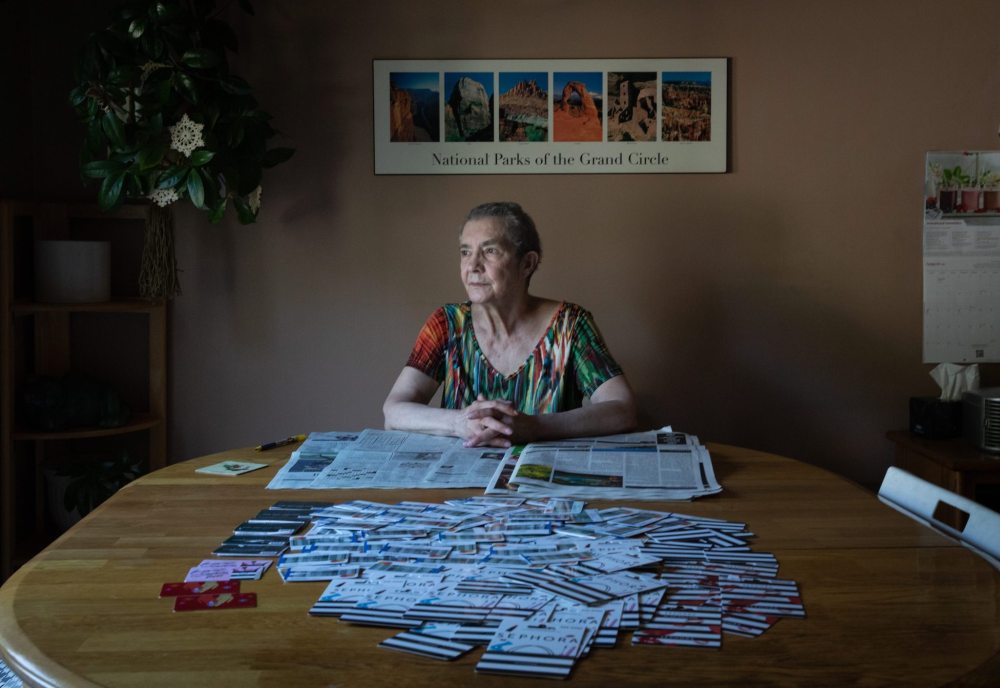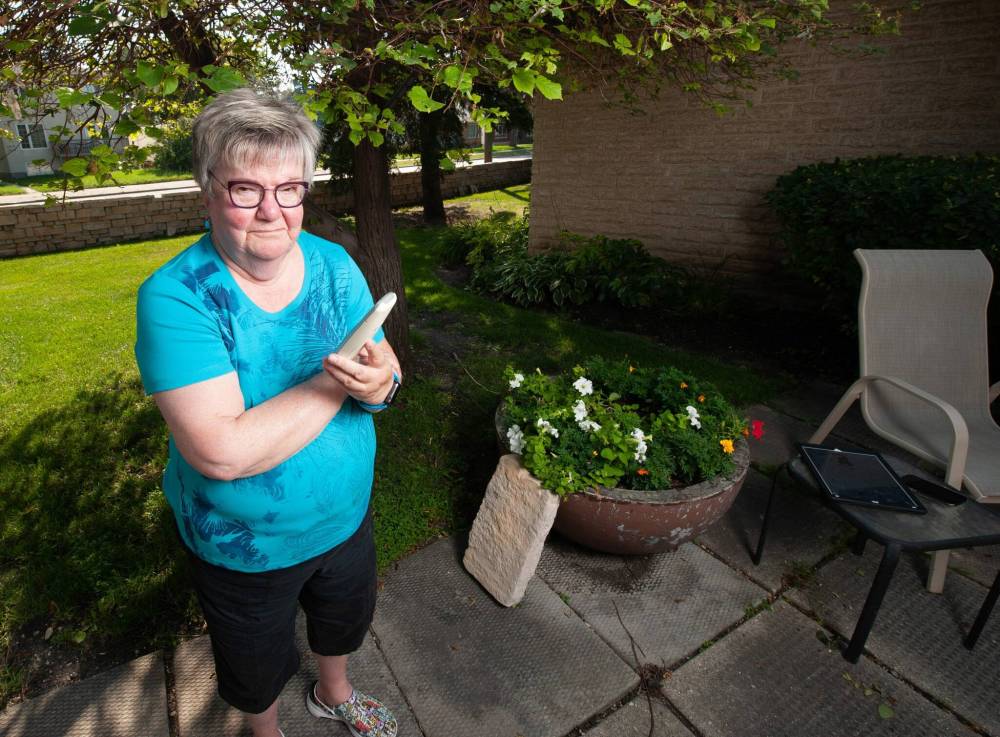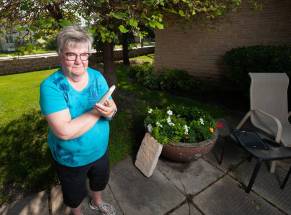‘It sounded very legitimate. They were very persuasive’ Lorette senior speaks out after losing $50,000 as police report spike in gift card scams
Read this article for free:
or
Already have an account? Log in here »
To continue reading, please subscribe:
Monthly Digital Subscription
$0 for the first 4 weeks*
- Enjoy unlimited reading on winnipegfreepress.com
- Read the E-Edition, our digital replica newspaper
- Access News Break, our award-winning app
- Play interactive puzzles
*No charge for 4 weeks then price increases to the regular rate of $19.00 plus GST every four weeks. Offer available to new and qualified returning subscribers only. Cancel any time.
Monthly Digital Subscription
$4.75/week*
- Enjoy unlimited reading on winnipegfreepress.com
- Read the E-Edition, our digital replica newspaper
- Access News Break, our award-winning app
- Play interactive puzzles
*Billed as $19 plus GST every four weeks. Cancel any time.
To continue reading, please subscribe:
Add Free Press access to your Brandon Sun subscription for only an additional
$1 for the first 4 weeks*
*Your next subscription payment will increase by $1.00 and you will be charged $16.99 plus GST for four weeks. After four weeks, your payment will increase to $23.99 plus GST every four weeks.
Read unlimited articles for free today:
or
Already have an account? Log in here »
Hey there, time traveller!
This article was published 26/08/2022 (1198 days ago), so information in it may no longer be current.
Dolores Brommell thought she was doing a good deed when a man claiming to be a bank employee told her RCMP needed her help in an undercover sting to catch the ringleader of a con.
However, the Lorette senior was unknowingly being lured into a gift card scam which ended with her losing more than $50,000.
“It sounded very legitimate. They were very persuasive,” the 71-year-old said. “I thought I was helping out.”
The Winnipeg Police Service’s financial crimes unit, which is investigating the fraud, has had an increase in reports of gift card scams, said spokeswoman Const. Dani McKinnon.
The scam usually involves a cold call and often targets older adults.
Brommell was targeted when a scammer claiming to be a Royal Bank of Canada employee called her July 12.

During a series of conversations, she was instructed to buy prepaid credit cards and gift cards — more than 100 in total — using her bank card and cash from ATM withdrawals as part of the undercover operation.
The scammers then asked for the gift card numbers and PINs to use the money loaded onto them.
After being told she would be reimbursed, the con artists remotely took control of Brommell’s computer and showed her fake bank statements to further the scheme.
They told her to keep the undercover sting a secret from her family and bank staff, while $25,000 was taken from a line of credit.
“My major concern is how they were able to get into my line of credit,” said Brommell. “I didn’t even know I had a line of credit.”
The scam went on for 10 days until it was detected. She was called into an office at an RBC branch.
“A lot of red flags had been going on,” said Brommell, who doesn’t know if the bank will cover the loss.
“My major concern is how they were able to get into my line of credit. I didn’t even know I had a line of credit.” – Dolores Brommell
She accepts she was deceived, but is concerned the bank didn’t detect the unusual withdrawals or purchases sooner.
RBC declined to comment on the specifics.
“The matter has been escalated internally, and we will continue to work with our client in the process of our review,” a spokeswoman wrote in an email.
Customers who are unsure about a phone call or message can verify a request by calling official RBC numbers on the back of debit or credit cards or on the bank’s website.
The spokeswoman said RBC shares fraud-prevention tips with clients, and will never ask customers to take part in an undercover investigation.
The fraud against Brommell was reported to the RCMP.
Spokesman Sgt. Paul Manaigre said the scammer’s untraceable phone number was believed to be overseas.
The RCMP has concluded its investigation.
Top seniors scams
Fraud is the No. 1 crime against older Canadians, according to data from the federal government.
Here are five common financial scams against them.
Fraud is the No. 1 crime against older Canadians, according to data from the federal government.
Here are five common financial scams against them.
- Grandparent or emergency scam: Scammers often claim to be a grandchild who needs money immediately to get out of trouble. The grandparent is urged not to tell the caller’s parents.
- Investment scam: Fraudsters pose as family, friends or others to offer fake investment opportunities, with higher than normal returns. Most of these scams dupe victims into investing in cryptocurrency.
- Romance scam: Con artists use fake dating or social media profiles or emails to lure a victim into an online relationship. The person asks the victim to send money for travel, an emergency or as an investment.
- Bank investigator scam: Fraudsters claiming to be from a bank, law enforcement or an online retailer allege there have been unauthorized credit card charges or stolen funds. They ask for the victim’s credit card or bank details, including PINs, to stop the fraud.
- Service scams: Common versions include air duct cleaning, help with documents or tech support. In the latter, a scammer claims a personal computer has been hacked or is infected with a virus. The person requests access to the computer and then demands money for “fixing” it.
— Source: Canadian Anti-Fraud Centre
“The only advice I can give people is to do their due diligence when they receive a suspicious email or phone call,” said Manaigre. “If the caller states they’re calling from their bank, then when you hang up, call your banking institution and confirm with them what was requested of you.
“This would also apply to any request via email where account information is being asked for.”
Older adults should speak to a trusted relative or friend to find out if what is being asked makes sense, he said.
Fraud victims should immediately contact the police, their bank and the Canadian Anti-Fraud Centre.
Amid the uptick in gift card scams, McKinnon said one recent victim lost $40,000.
“We have received reports of gift card-type scams, unfortunately, involving elderly victims,” she said. “These fraudsters play on the good, helpful nature of average people. The victims truly believe they are helping.”
People should not divulge any information over the phone, said McKinnon.
In late July, city police warned about an increase in grandparent or emergency scams targeting seniors, with 15 incidents in six days.
Two Ontario women were arrested in Fort Garry and charged with fraud and other offences.
The losses amounted to between $200,000 and $300,000, said McKinnon, noting there have been no reports of grandparent scams since the arrests.
Often in that type of scam, an actor calls an older person and claims to be a grandchild who needs money to get out of serious legal trouble.
Connie Newman, executive director of the Manitoba Association of Seniors Centres, said scam victims have lost their life savings or large sums of money, including one who was conned out of $110,000, she said.

“Some end up in poverty. If you take a retired person who loses $25,000 of their savings, it’s devastating,” she said. “This is not a senior issue. It’s a life issue we need to keep track of.”
Because of cold callers and automated recordings, she has stopped answering her landline at home unless she recognizes the number.
Newman is encouraging people to talk openly about fraud or suspicious phone calls to break the stigma and spread awareness.
Some victims are embarrassed and don’t want to tell anyone.
“Older adults are isolated to a degree because of COVID,” said Newman. “We need to be reaching out to them. Family members need to have the conversation with older adults to make sure they are aware of what’s going on.
“We must put it out that it’s OK to talk about it and say, ‘I almost got caught,’ or, ‘I got the phone call.’”
“Some end up in poverty. If you take a retired person who loses $25,000 of their savings, it’s devastating. This is not a senior issue. It’s a life issue we need to keep track of.” – Connie Newman
The seniors association holds workshops and regularly sends information to its members to raise awareness and prevent fraud, she said.
Mathieu Labrèche, a spokesman for the Canadian Bankers Association, said banks investigate all fraud claims on a case-by-case basis while determining liability.
“Security is a shared responsibility and customers have a role to play,” he wrote in an email. “Canadians must stay vigilant, adhere to safe online practices and distinguish between legitimate requests and attempted fraud.”
To prevent and detect fraud, banks use awareness programs, advanced computer technologies and systems, and training to help front-line staff investigate unusual transactions, said Labrèche.
chris.kitching@freepress.mb.ca
Twitter: @chriskitching
As a general assignment reporter, Chris covers a little bit of everything for the Free Press.
Our newsroom depends on a growing audience of readers to power our journalism. If you are not a paid reader, please consider becoming a subscriber.
Our newsroom depends on its audience of readers to power our journalism. Thank you for your support.









